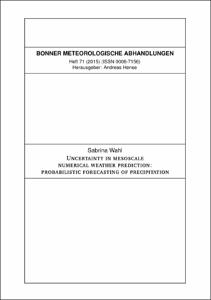Wahl, Sabrina: Uncertainty in mesoscale numerical weather prediction : probabilistic forecasting of precipitation. - Bonn, 2015. - Dissertation, Rheinische Friedrich-Wilhelms-Universität Bonn.
Online-Ausgabe in bonndoc: https://nbn-resolving.org/urn:nbn:de:hbz:5n-41901
Online-Ausgabe in bonndoc: https://nbn-resolving.org/urn:nbn:de:hbz:5n-41901
@phdthesis{handle:20.500.11811/6560,
urn: https://nbn-resolving.org/urn:nbn:de:hbz:5n-41901,
author = {{Sabrina Wahl}},
title = {Uncertainty in mesoscale numerical weather prediction : probabilistic forecasting of precipitation},
school = {Rheinische Friedrich-Wilhelms-Universität Bonn},
year = 2015,
month = nov,
volume = 71,
note = {Over the last decade, advances in numerical weather prediction (NWP) led to forecasts on even finer horizontal scales and a better representation of mesoscale processes. High-resolution mod- els provide the user with realistic weather patterns on the km-scale. However, the evaluation of such small-scale model output remains still a challenge in forecast verification and the quan- tification of forecast uncertainty. Ensembles are the main tool to assess uncertainty from NWP models. The first operational mesoscale NWP ensemble was developed by the German Meteo- rological Service (DWD) in 2010. The German-focused COSMO-DE-EPS is especially designed to improve quantitative precipitation forecasts, which is still one of the most difficult weather variables to predict.
This study investigates the potential of mesoscale NWP ensembles to predict quantitative pre- cipitation. To comprise the uncertainty inherent in NWP, precipitation forecasts should take the form of probabilistic predictions. Typical point forecasts for precipitation are the probability that a certain threshold will be exceeded as well as quantiles. Quantiles are very suitable to predict quantitative precipitation and do not depend an a priori defined thresholds, as is necessary for the probability forecasts. Various statistical methods are explored to transform the ensemble forecast into probabilistic predictions, either in terms of probabilities or quantiles. An enhanced framework for statistical postprocessing of quantitative precipitation quantile predictions is de- veloped based on a Bayesian inference of quantile regression.
For a further investigation of the predictive performance of quantile forecasts, the pool of verification methods is expanded by the decomposition and graphical exploration of the quantile score. The decomposition allows to attribute changes in the predictive performance of quantile forecasts either to the reliability or the information content of a forecasting scheme. Together with the Bayesian quantile regression model, this study contributes to an enhanced framework of statistical postprocessing and probabilistic forecast verification of quantitative precipitation quantile predictions derived from mesoscale NWP ensembles.},
url = {https://hdl.handle.net/20.500.11811/6560}
}
urn: https://nbn-resolving.org/urn:nbn:de:hbz:5n-41901,
author = {{Sabrina Wahl}},
title = {Uncertainty in mesoscale numerical weather prediction : probabilistic forecasting of precipitation},
school = {Rheinische Friedrich-Wilhelms-Universität Bonn},
year = 2015,
month = nov,
volume = 71,
note = {Over the last decade, advances in numerical weather prediction (NWP) led to forecasts on even finer horizontal scales and a better representation of mesoscale processes. High-resolution mod- els provide the user with realistic weather patterns on the km-scale. However, the evaluation of such small-scale model output remains still a challenge in forecast verification and the quan- tification of forecast uncertainty. Ensembles are the main tool to assess uncertainty from NWP models. The first operational mesoscale NWP ensemble was developed by the German Meteo- rological Service (DWD) in 2010. The German-focused COSMO-DE-EPS is especially designed to improve quantitative precipitation forecasts, which is still one of the most difficult weather variables to predict.
This study investigates the potential of mesoscale NWP ensembles to predict quantitative pre- cipitation. To comprise the uncertainty inherent in NWP, precipitation forecasts should take the form of probabilistic predictions. Typical point forecasts for precipitation are the probability that a certain threshold will be exceeded as well as quantiles. Quantiles are very suitable to predict quantitative precipitation and do not depend an a priori defined thresholds, as is necessary for the probability forecasts. Various statistical methods are explored to transform the ensemble forecast into probabilistic predictions, either in terms of probabilities or quantiles. An enhanced framework for statistical postprocessing of quantitative precipitation quantile predictions is de- veloped based on a Bayesian inference of quantile regression.
For a further investigation of the predictive performance of quantile forecasts, the pool of verification methods is expanded by the decomposition and graphical exploration of the quantile score. The decomposition allows to attribute changes in the predictive performance of quantile forecasts either to the reliability or the information content of a forecasting scheme. Together with the Bayesian quantile regression model, this study contributes to an enhanced framework of statistical postprocessing and probabilistic forecast verification of quantitative precipitation quantile predictions derived from mesoscale NWP ensembles.},
url = {https://hdl.handle.net/20.500.11811/6560}
}






